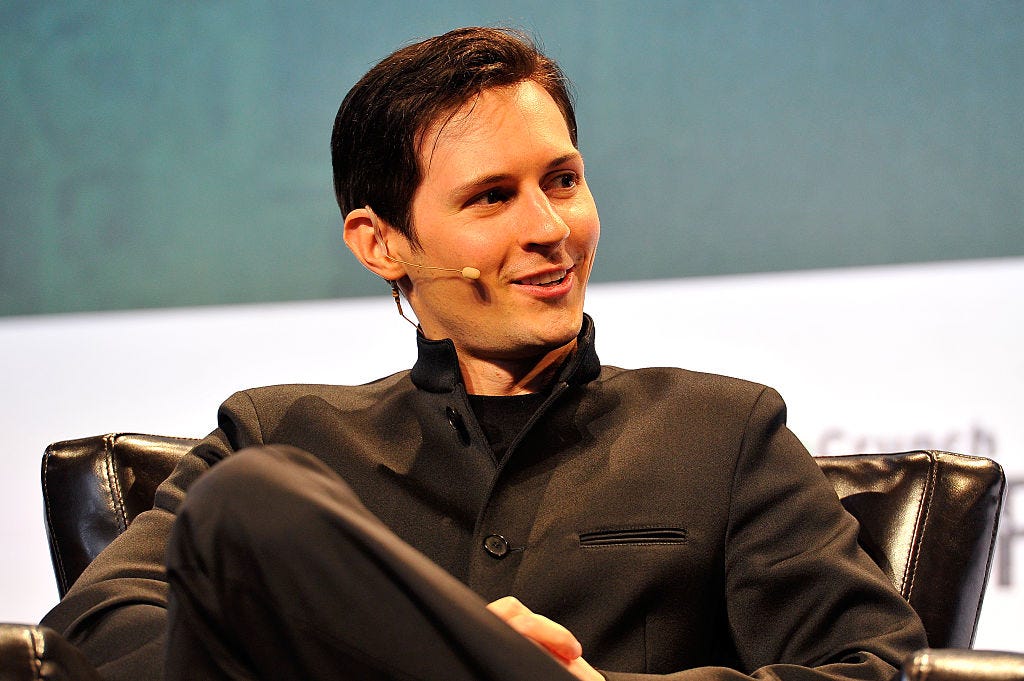Steve Jennings/Getty Images
- If you're American, you may not have heard of, or used, Telegram.
- In some parts of the world, though, the just-about-anything-goes messaging app is a big deal.
- Which is why the arrest of its founder, and the questions that raises, are a big deal, too.
French police arrested Telegram CEO Pavel Durov over the weekend. The move generated alarm among the services' 900 million users around the world, as well as other observers wondering what it meant for other tech and social media companies that do business around the globe.
The news may also be confusing to lots of people who have never heard of Durov, or Telegram itself. Like Meta's Whatsapp, Americans are much less likely to use Telegram than people in the rest of the world. And while the service's Wild West ethos makes it attractive to some people, it remains under the radar to others.
Adding to the confusion: We still don't know much about why Durov has been arrested or what will happen next. So consider this an incomplete explainer-in-progress.
What is Telegram?
It's a social media service, founded in 2013, that works broadly similar to Twitter or Facebook. That is: It allows users to broadcast text, photo, and video messages to different sized-audiences — you can talk to a single user or a lot of users at the same time. The major difference with platforms like Facebook, YouTube, or Twitter is that there's next to no moderation on the platform. Which means you can post just about anything you want there.
The platform's anything-goes aspect means you can do… just about anything you want on it. Both Russian and Ukrainian citizens have been using it to learn about the war that began in early 2022, even though much of what appears there about the conflict is dubious. Usage of the app has skyrocketed in Israel and Gaza since the October 7 attacks last year.
Rioters in the UK used Telegram to communicate with each other this month, though Tommy Robinson, a far-right figure linked to the violence, claims that Apple and Android phones cut off access to his Telegram channel earlier this year. The app has long been accused of serving as a tool for terrorists and child pornographers, in part because of the encryption it offers for some of its messaging.
But you can also use it for banal, basic stuff — like organizing tennis matches, as Semafor editor Ben Smith does.
Telegram also became a hangout for crypto/Web3 fans during the last crypto bubble. TON, a cryptocurrency connected to the service, saw its value drop sharply following Durov's arrest this weekend.
Why was Pavel Durov arrested on Saturday?
We don't know with any real certainty, since French officials haven't said much. But on Monday, The New York Times reported that a French prosecutor said Durov was arrested as "part of an investigation opened on July 8 'against person unnamed' on a raft of potential charges, including complicity in the distribution of child pornography and selling of drugs, money laundering, and a refusal to cooperate with law enforcement."
Durov himself has yet to be charged.
On Sunday, Reuters, citing a French police source, said that Durov "was arrested as part of a preliminary police investigation into allegedly allowing a wide range of crimes due to a lack of moderators on Telegram and a lack of cooperation with police." The Times had speculated that "French authorities may try to force Telegram to share information with them on criminal channels that, for instance, are used to sell firearms or coordinate terrorist attacks."
There have also been unconfirmed suspicions that Durov's arrest had something to do with strained relations between France and Russia.
Durov, who lives in Dubai, is a Russian citizen. And while he has said he started Telegram because of a dispute with Russian authorities, the government there has allowed Telegram to stay in business while it has blocked other social media services like Facebook and Twitter.
That's led observers like tech analyst Ben Thompson to float the possibility that Durov's arrest is "on the level of espionage and spycraft." On Monday, French President Emmanuel Macron insisted this was not the case, saying the arrest was part of an "ongoing judicial investigation" and that "this is in no way a political decision. It is up to the judges to decide."
Why is this such a big deal?
The most obvious reason is that we haven't seen someone who runs a big social media platform arrested when traveling abroad before. Picture Mark Zuckerberg or Elon Musk getting tossed in jail after stepping off their private plane.
That said, people who run tech companies with global reach — generally, Americans who live in America — have been dealing with the fact that different countries have different rules about tech and the internet for quite some time. And the way they've dealt with those differences is by accepting the rules of the road in the countries where they operate.
That's why Apple took down an app used by Hong Kong protestors in 2019, after China complained. And it's why Netflix took down an episode of comedian Hasan Minhaj's show that was critical of Saudi Crown Prince Mohammed bin Salman, after Saudi officials said the show violated an anti-cybercrime law.
That's not the only option for US or Western companies who don't like the way their services are regulated in other countries. Some companies have fought local rules or regulators, like Twitter did in India prior to Musk's purchase of the service, or as Musk has done with his service in Brazil. Musk recently announced that he was shuttering his company's operations in that country, though the service would remain accessible to Brazilian users.
